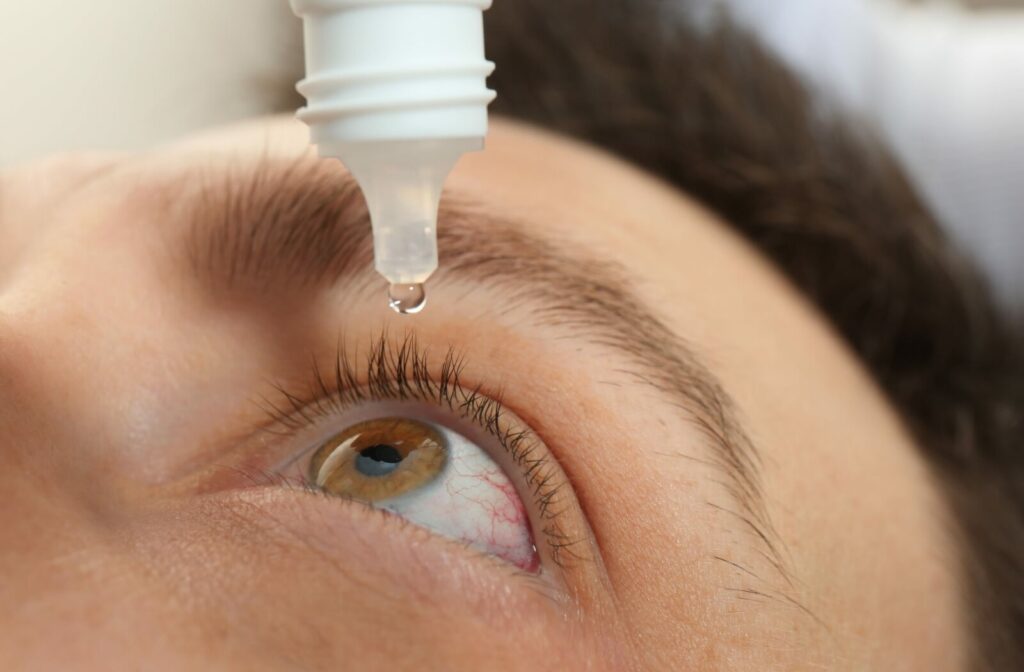Dealing with a runny nose, sneezing, and a scratchy throat during a cold is unpleasant enough. But what if you start noticing redness and eye irritation, too? The common cold, a problem many people face, can affect your whole body—including your eyes.
Yes, a common cold can affect your eyes. It irritates the surrounding areas, leading to symptoms such as watery eyes and inflammation. This is very common—and fortunately, you can take several steps to effectively find relief.
What Is the Common Cold?
The common cold is a viral infection that targets your upper respiratory system. It’s highly contagious, and it spreads easily through sneezing, coughing, or contact with contaminated surfaces. Typically, it lasts for a few days, sometimes up to a week.
When you have a cold, your body reacts by producing more mucus to flush out the virus and other irritants. This can sometimes affect other areas throughout the body, and lead to all kinds of uncomfortable symptoms.
How to Recognize a Common Cold
You can recognize the common cold by:
- A runny or stuffy nose
- Sneezing
- Sore throat
- Mild cough
- Fatigue
- Low-grade fever
Although colds seem confined to your nose and throat, the effects can eventually reach your eyes. This then creates an uncomfortable blend of symptoms to manage.
Why Do Colds Affect the Eye?
Your eyes might react to your cold for a few reasons, all tied to how your body processes this viral infection. Because the immune system prompts the body to produce more mucus and other fluids, it puts additional strain on your eyes.
Meanwhile, colds inflame the sinuses—the air-filled passages behind your nose, eyes, and cheeks. Sinus inflammation is a common side effect of colds, which leads to eye irritation and redness.
And even worse? If you have itchy eyes during a cold, you’ll likely subconsciously touch or rub them. This can transfer germs and bacteria to the eye, which makes irritation worse.
The common cold can be frustrating. So what are your options?
Tips for Relief When You Have a Cold
Relieving your cold symptoms and soothing your eyes doesn’t have to be complicated. Follow these easy tips to help your body recover:
- Use a cold compress to reduce eye discomfort and puffiness.
- Stay hydrated to minimize sinus pressure and irritation.
- Avoid rubbing your eyes to prevent further redness or infection.
- Try preservative-free artificial tears to keep your eyes moist and comfortable.
- Get plenty of sleep to allow your immune system to focus on recovery.
These small actions can make all the difference. They take the pressure off your immune system and help it do its job. This way, you can find relief while your body naturally fights the cold.
Signs You Need to Visit an Optometrist
Most cold-related eye symptoms are mild. However, this isn’t always the case. Sometimes, you may need to see a professional to make sure you can effectively manage your symptoms.

Meanwhile, other eye conditions are easy to mistake for the common cold. Don’t ignore any unusual eye-related symptoms—pay attention to problems such as:
- Persistent redness or irritation
- Blurred or fluctuating vision
- Sensitivity to light
- Excessive tearing or discharge
- A sensation of a foreign object in the eye
- Difficulty focusing or seeing clearly despite rest
- Sudden eye pain
These signs could indicate something more serious. If you notice anything odd, visit your optometrist as soon as you can. They can examine your eyes to determine if you need immediate attention, and give you practical advice for finding relief.
Preventing Cold Symptoms
Keeping your eyes healthy during cold season is key. It’s essential to practice good habits and preventive measures to avoid developing symptoms where possible. Maintaining good hygiene is essential, so it’s important to ensure that you:
- Wash your hands regularly to reduce the spread of germs to your eyes.
- Avoid sharing items like makeup or contact lenses to lower the risk of infection.
- Switch to glasses when you’re sick, as they’re less likely to irritate than contact lenses.
- Schedule regular eye exams to catch and treat potential issues early.
- Include nutrient-rich foods, such as leafy greens, fish, and berries in your diet to support eye health.
These steps may be simple, but they can make a significant difference in your day-to-day comfort. This way, you can lower the risk of developing the cold in the first place, and avoid all the unusual symptoms it can cause.
Find the Relief You Deserve
A common cold can leave you feeling under the weather in more ways than one. Eye problems are common when colds are involved, but small steps make all the difference. With helpful remedies, good habits, and professional care when needed, relief is within reach.
If you’re experiencing eye discomfort or think something more serious could be at play, contact our team here at Vivid Eye Care. We’re here to keep your eyes and vision in great shape – because you deserve the best.. Contact us today to book your appointment—we’re here to help!






















